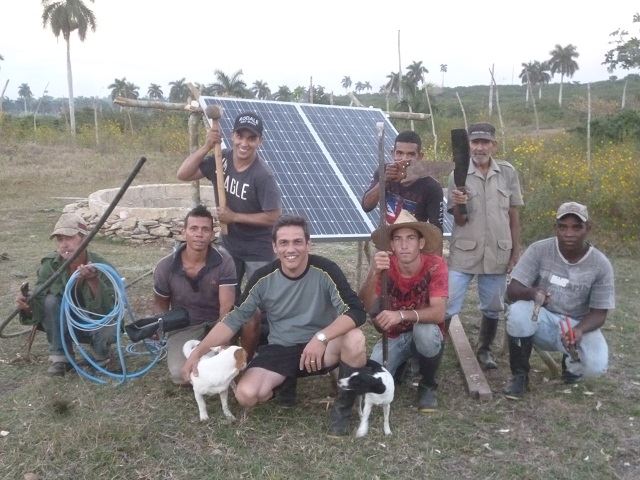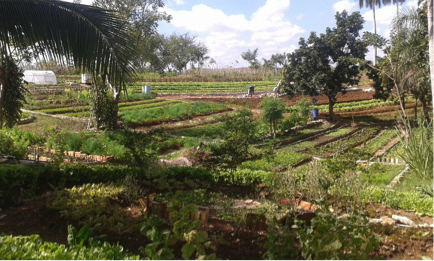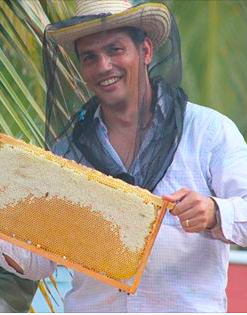Farming First is pleased to act as media partner for the Louis Malassis International Scientific Prize and the inaugural Olam Prize for Innovation in Food Security. Our new blog series will showcase stories from scientists nominated for these prestigious prizes.
The third blog in this series outlines the work of Dr. Fernando Rafael Funes Monzote, nominated for the Louis Malassis International Scientific Prize for Outstanding Career in Agriculture.
Adopting agro-ecological approaches for a food-secure Latin America
Adapting to climate change needs smart interventions in the way food is produced, but even smarter strategies are needed to holistically redesign the way in which the food system works. Dr. Fernando Funes Monzote, a farmer and distinguished agroecologist from Cuba, has spent the last 20 years working to meet the challenges small-scale farmers face, through agroecological approaches on a large scale.
Agroecology involves fostering and spreading farmers’ collective knowledge in particular environments — a knowledge that coevolves with a strong scientific foundation and a well-organised social base — to design and manage more efficient, productive and environmentally sound farming systems.
For example, farmers adapt to climate change by making choices according to short-term and site-specific weather patterns.
Based on his career of scientific study, Dr. Funes Monzote has concluded that it is possible to produce enough food for the Cuban population on just half of its existing agricultural lands with low environmental impacts through agroecological approaches. By implementing integrated farming systems, that are able to recycle nutrients and energy, Dr. Funes Monzote believes there are conditions to move towards an agroecological food system at a national scale. “This has been the goal of my scientific career,” he comments,“as I moved from science to practice, and back to science.”
Dr. Funes Monzote has been involved in the implementation of several projects in Cuba that have helped the nation move towards more sustainable farming practices:
Finca Marta
Established by Dr. Funes Monzote himself, the Finca Marta project is a family farming operation that intends to connect science from the local knowledge and practice through research and education, production, processing, commercialization and consumption. Produce from the agroecological farm is now being sold to private restaurants and families that form a network of trust and common concerns among consumers and producers. In three years some 4,000 people have visited the farm in study tours, meetings and other related activities, which has allowed Dr. Funes Monzote to disseminate his scientific research to this audience effectively.
The farm, built from in area that was abandoned for more than 20 years, now produces more than 25 vegetables species, has 40 beehives that have produced nearly 2 tonnes of honey in the last year, and grazing and forage areas for twelve bovines. Finca Marta also has a livestock unit connected to a biodigester that produces all energy needed for cooking, as well as a solar pump from a well that Dr. Funes Monzote made himself.

“One of the hardest jobs I’ve ever done was digging that well through rock, looking for water in the dry season — but it was how I found a metaphor for agroecology: the more you dig, the deeper the water goes.”
Over a three year period Finca Marta has created 10 jobs, the workers and their families now earn good salaries and have incomes that have improved their lives.

Energy alternatives for the Cuban agricultural sector
Biogas, gasification and biodiesel are now available for use on farms in over 20 municipalities in Cuba, impacting over 25,000 families. The project Biomas-Cuba was financed by the Swiss Cooperation Agency (COSUDE) and aimed to set up the integrated production of foods and energy to improve living conditions and attaining the coexistence between mitigation and adaptation to climate change, food security and energetic sustainability in rural areas.
Several Cuban farms are also now operating on renewable energy in Eastern Cuba. The project, developed in six municipalities, has about 27,000 beneficiaries. Financed by the European Union and Hivos of Holland, it focuses on Integrated Agricultural Systems (SAI) with emphasis on the application of energy use technologies such as wind power, biodigesters and photovoltaic energy. Both projects apply concepts and methodologies for designing and monitoring energy efficient agricultural systems developed by Dr. Funes Monzote and are having an important impact in generation of energy alternatives for the Cuban livestock sector.
Dr. Funes Monzote also developed, in collaboration with other Cuban scientists, the computerized system Energia 3.01 which enables energy balance calculations in agroecosystems. The system has been applied in more than 20 countries as a tool for improving the understanding of how to design and manage energy efficient agroecological systems.
“This goes beyond technology or technological innovation: it’s about learning how to live in the countryside, understanding local dynamics and exchanging information about adapted experiences and technologies in order to modernise rural life,” says Dr.Monzote.
“The best way — and the most difficult step towards building bridges between the discourse and real-life agroecological challenges — is to get scientists directly involved with farming, education, commercialisation and policy. This is what I have tried to do throughout my career”.
The winners of the Louis Malassis International Scientific Prize and Olam Prize for Innovation in Food Security, will be announced at the Third Global Science Conference on Climate Smart Agriculture on 16th March, 2015.




